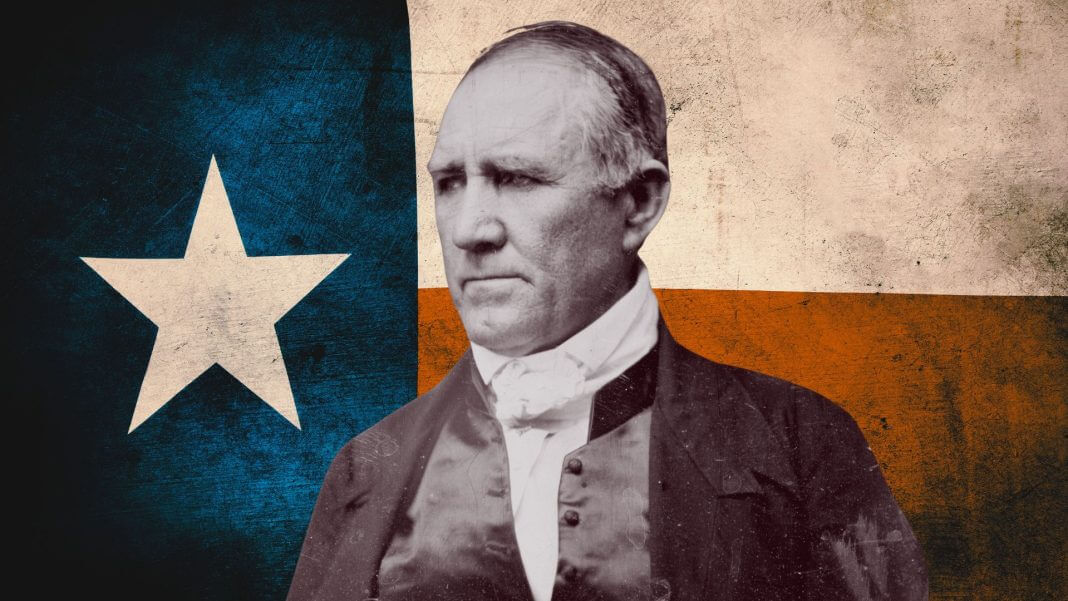Much has been made about Sam Houston’s opposition to Texas withdrawing from the union in the 1860s. Opponents of TEXIT scream that Sam Houston would be vehemently opposed to our modern day movement because of his opposition to the withdrawal of Texas in his day. But is that actually true?
We have previously published articles debunking the myth of Houston’s absolute opposition to states withdrawing from the union. You can read one of them here.
However, once the citizens of Texas voted for independence, Houston was required to clarify his position. As his previous opposition had been weaponized and used as propaganda by the federal government, Houston took pen to paper and laid out his thoughts on the matter. His letter, published in The New Orleans Daily Crescent on October 1, 1861, left no room for doubt as to his position, the lengths that Lincoln and federal government would go to in order to keep Texas from joining the Confederacy, and Houston’s clear vision on how the conflict could be resolved.
The entire letter is presented for you below in full.
By this, you will perceive that my name has been unwarrantably referred to, and my present attitude most egregiously misapprehended, or most wantonly misrepresented. Previous to the act of secession by Texas and whilst the measure was one of argument and opinion, my opposition to it was open and avowed, and my opposition to the acts of the Convention was not concealed, but was, on all becoming occasions, fully expressed, nor did I cease that expression of opposition to the measures of secession until the people acquiesced in it, when I, as one of them, unhesitatingly assented to this conclusion; since which time, I have attempted to throw no impediment in the way of this action; but on the contrary, have performed all the acts of a dutiful and loyal citizen of the Southern Confederacy. This was doing no more than what became me, for I have lived and acted upon the principle that all public officers should obey the will of their constituents and all private citizens support the government which secures to them their liberties.
Whilst the convention was in session, I presented a communication to the Legislature accompanying resolutions forwarded to me by the Executive of Tennessee on the subject of coercion, in which I denounced unqualifiedly such a measure of Federal policy; since then my opinion has undergone no change I have seen no necessity nor have I any desire to see my name paraded in the newspapers either as a speech maker, or a correspondent. In these matters, my “occupation is gone,” and now I write for the purpose of removing any delusion that may be resting upon the minds of friends or enemies. I am aware that many honest minds have been deluded by the publications of editors in this State, who have slandered me unscrupulously, some of them for eighteen years, and all of them since their advent into the country, as I believe, because they were ambitious and wished to become distinguished, and if they should fail in this from a lack of talent, they would at least have the satisfaction of becoming notorious by connecting their opposition and abuse with my name. A trio, at least, of these editors came from North of the Mason and Dixon’s line, and no doubt were of an ultra- stripe in the North; it was natural enough, then, that they should become extremists in the South, and opposed to the conservatism which I have always maintained and advocated up to the present crisis of our country; and now, I am conservative, because I am maintaining our sovereignty and independence, as I believe we are entitled to it and capable of sustaining it. Had I been disposed to involve Texas in civil war, I had it in my power, for I was tendered the aid of seventy thousand men and means to sustain myself in Texas by adhering to the Union; but this I rejected, and in return for the offer, I gave my advice to the Federal Government that I wanted no money, I desired no office, and wished for no troops, but if Mr. Lincoln were wise, and really wished to confer a benefit upon the country, he would evacuate Forts Pickens and Sumter, recall all the Federal troops from Texas, and not take the advice of such men as General Scott, or his administration would be disgraced. Notwithstanding this, when my message was reported to Mr. Lincoln by his own messenger, it appeared from confidential letter-writers in Washington that he did not believe that his agent had been faithful in the discharge of his trust in reporting my opinion. To this conclusion he was led, no doubt, by the editors referred to piling up and repeating the charges upon my reputation of abolition and treason to the South. So strong was his belief, as stated by the writer, in these slanders that he immediately resolved to send another messenger and troops to the South.
Facts which have transpired before the people of Texas for the last twenty years would offer me a vindication much stronger than any which I shall ever attempt, were the parties cognizant of them still living, but most of them have been gathered to their fathers. I might refer to facts without boasting, although I have not had a personal participation in the war, nor have I yet perceived a necessity for so doing. My only son above the age of childhood, and he is only a stripling of eighteen, attached himself to the first company that was raised in the neighborhood, has been mustered into the service for during the war, and is discharging the duties of a soldier, equipped to meet the enemies of the Southern Confederacy; and in addition to this no less than four nephews have enlisted for during the war, and are now on their march to Virginia. I might cite these facts as evidences in vindication of myself, if I chose so to do, but such is not the object, it being merely done for the gratification of boasting a little, and to let those who were most forward in secession, see whether they have done more than I have done, or that I am still willing to do for the Southern Confederacy. And more than this, I have three other nephews who have been in Virginia from the commencement of the war, with the other Southern troops. There are those who in the outset of secession, were the most eloquent exhorters and sensationalists, who declared that if war was the consequence of secession, they would be found in the van of battle, but who have retired and are securely ensconced in their seclusion, and “cooing gently as sucking doves .”
There was a time when there was a powerful Union sentiment in Texas, and a willingness on the part of many true patriots to give Mr. Lincoln a fair trial in the Administration of the Federal Government. There was also a time when many of the best men in the country hoped that by energetic demonstration they might bring about a reconstruction of the government, upon such principles as might guarantee the rights of the South. These times have passed by, while Union and Reconstruction have become obsolete terms, or if ever mentioned, it is only in reference to past events. If there is any Union sentiment in Texas, I am not apprised of it. When the millions of Persia invaded Greece, the Spartans were not more united in defence of their country and liberties than Texas was united in support of the Southern Confederacy. All the facilities of newspapers, with all the arts which can be devised, will never be able to controvert one of these statements. The reasons are obvious. The people of the United States had been born and reared under the aegis of the Union, that Union was dependent on the Constitution; and the adoption of it gave life, and the disregard of it has led to its destruction. Mr. Lincoln and his cabinet have usurped the powers of Congress, and have waged war against the sovereign States, and have thereby not only absolved the States, but all the people of the several States from their allegiance to his government, the Federal Government having ceased to exist by his acts of usurpation. He has, through his officers, suspended the writ of habeas corpus, the bulwark of American liberty, and proclaimed martial law in sovereign States. If I am to rely upon the current intelligence of the day, he has, through his Major General, Mr. John C. Fremont, proclaimed martial law in Missouri, and assumed the civil administration of the affairs of that State, thereby ignoring the Constitution, and setting at naught the sovereignty of the people; and who has, in fact, with more than Vandalic malignity and Gothic hate, sought to incite a servile insurrection in that State. If the last feather has been wanting to break the camel’s back, this act of atrocity would have supplied it. His acts and feelings are such as have never failed to characterize the heart of the renegade. Suppose Mr. Lincoln, as he was the aggressor, by invading the soil of a sovereign State, and causing the blood of her sons to be shed, even in the neighborhood of the scarred remains of Washington, after having become President upon a sectional issue, in derogation of the teachings of his farewell address, wishes to make reparation for the wrongs inflicted. In that case, he has but one course left, and in my opinion, that course is to propose an armistice that shall withdraw all the Federal troops from Virginia, suspend the action of the Federal forces in all the Southern States, and the Confederate authorities at the same time guaranteeing that they will not advance their troops into any territory not now occupied by them until the meeting of the Confederate and Federal Congresses, at their next meeting. Should this course be pursued, there is little doubt that the good sense and the patriotism of the two sections, would adopt such measures as would insure peace, arrest the further destruction of human life, restore, to a great extent, the prosperity of the two sections; for it cannot be imagined that a vain hope of restoring the Union, can ever be realized. The South can never reunite with the North, nor can the North entertain any rational hope of her subjugation. The sooner the war is ended, the greater will be the probability of establishing friendly relations between the two sections, and this cannot fail to promote the mutual prosperity of both. Should this be disregarded, a terrific responsibility must rest upon the heads of those who either interpose power or authority to its consummation.
Trusting that no further misapprehension of my opinions and feelings may be entertained by anyone, I have been thus explicit, and submit them for what they are worth, to the world.
Sam Houston
9/12/1861
SOURCE: The New Orleans Daily Crescent , October 1 , 1861.



Reading what Pres Sam had to say the US government started the the civil war going completely against the constitution. Seems Lincoln didn’t adhere to Sam or blew him off. The civil war wasn’t about slaves as people want to think it was about money. If it was slavery then why was the north last to abolish it? It’s was because the south made more money off of cotton and tobacco and the rich northerners didn’t like it and pushed Lincoln into it, even throwing the constitution out from what Sam says. I knew about the economic cause but not the blatant attack on the people by the military. This need to be put out there for all to see the truth.
Jake